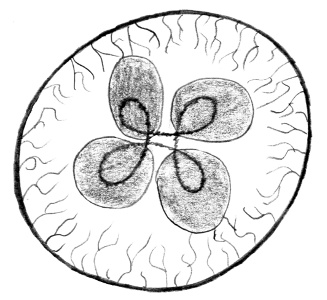The right place at the right time

One of my favourite games is Osmos, a sort of abstract biophysics game. You're a tiny blob, and you propel yourself around by expelling your mass in the form of even smaller blobs. A larger blob absorbs a smaller one, so you win by eating larger and larger blobs until you're the biggest blob in town. The reason I like it so much is I think it teaches a really important lesson about parsimony.
When you first start playing the game, you splurt mass all over the place trying to catch smaller blobs, but in the process you use up all your mass and end up tiny and weak. Worse still, the mass you spray around indiscriminately gets absorbed by the other blobs, making them stronger. Eventually, you learn that the best strategy is to make small, efficient movements. A little nudge here, a little nudge there, and wait.
I think this is common of all skills. Watch a child learning to walk, it's like they're in a constant struggle with gravity. An adult, on most nights, doesn't struggle at all. The difference isn't that an adult is stronger, it's that they know exactly how and when to activate the muscles in their legs and arms. The more precisely they do this, the less effort it takes to do it. It doesn't feel like it, but every time we move around we are engaged in a stunning and intricate dance of differential equations and multiple pendulums. All you have to do is move one of those pendulums in a way it doesn't expect and you can watch the whole circus come crashing down.
The key observation here is that, in all of these things, there is a kind of sweet spot, an exact right place at the exact right time. If you act then and there, it costs you nearly nothing. A little push just so, and the whole thing almost moves on its own. But if you act too early, too late, push in the wrong place or in the wrong way, everything gets difficult very quickly. You have to push harder because you're fighting the natural movement of the system, and worse still maybe you added some other extra unwanted movement that you later have to cancel out, leading to even more pushes later on.
I've been thinking about that as part of the question of how things become easy. A lot of it isn't about being able to do things more, but learning how to do them less. The idea that you will eventually develop some kind of monumental inner strength that will let you do twice as much in a given day, or work twice as hard is, I think, misguided. I mean, like with any training, you get stronger, but the strength gains are miniscule compared to the multiplier of doing things more efficiently.